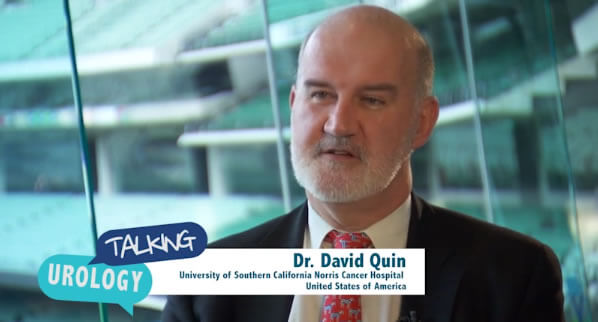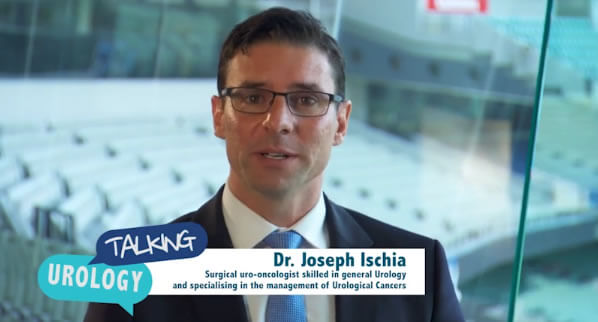ANZUP 2017 – Dr David Quinn
Dr David Quinn discusses the KEYNOTE-045 trial on the benefits of pembrolizumab in second line treatment of advanced bladder cancer.Talking Urology podcast transcript
ANZUP 2017 Interviews - Andrew Weickhardt and David Quinn
Andrew Weickhardt: Hi, I’m Associate Professor Andrew Walcott medical oncologist here in Melbourne Australia at the ANZUP session and we’re here with Associate Professor David Quinn talking about pembrolizumab in bladder cancer. He presented some interesting data at the meeting. Can you tell me about the key results from the Keynote study?
A/Prof David Quinn: Sure. I presented an update on Keynote-045, which is a study that compares an immunotherapy that targets PD-1 pembrolizumab to chemotherapy with taxanes or vinflunine in the second line after platinum therapy. This is an area where we’ve not had a standard of care in the past, although many drugs have been used and so the study was designed to compare pembrolizumab which had shown an activity in the setting to what was a relative choice of standard of care with three different chemotherapy drugs.
Andrew: What do you think the key takeaway messages for the practicing oncologists are from this study?
David: Well I think that the high points of the study are that pembrolizumab produces a higher response better, overall survival and less side effects than chemotherapy. It’s not quite a slam dunk as we say in the United States in that the PFS is no different. But this is something we see with the immunotherapy drugs, they tend not to produce a great PFS, they produce improvement in terms of response and overall survival.
Andrew: That’s something I’ve noted in my practice is certainly many patients progress very soon after starting them on an immunotherapy. What are the clinical parameters that might predict response or early progression on these that came from the study? I’m not talking about the biomarkers that we might test on tumor tissue but were there any predictive factors identified in the study?
David: Really not. There wasn’t a great predictive factor in the way we were testing the biomarkers but that didn’t work out. It wasn’t predictive of giving pembrolizumab or chemotherapy in one sense or another which is a bit frustrating. Who’s going to progress early? I think we don’t know and it’s something that we’re really working on. There’s also the issue of when patients have progression, do you leave the therapy? Waiting for response after progression can be a very difficult area and I think we’ve been a little bit tempered by some results that we’ve seen in this and another studies. Most particularly when we start out and look at the survival and the two curves, there’s a slight advantage to chemotherapy in the first 2 to 3 months. From that perspective, there’s an excess death risk for the patients that got the immunotherapy until it starts to work, so it seems to take a while and it would be nice to know who those people were that died early but at this point we don’t know. It was a small number of people but these are things that we have to continue to look at.
There was also a pattern that we saw in a more recently presented study that has not been published comparing tislelizumab immunotherapy to chemotherapy where there was a slight excess death risk for the people that got the immunotherapy in the first couple of months on that study.
Andrew: That was interesting. I suppose you’re touching on the IMvigor211 data and to recap there’s been several phase 1 and phase 2 trials of single arm trials of PDL1 inhibitors. They all had very similar response rates and the FDA approved in an accelerated fashion their use in the US. Many of us are expecting given that the pembrolizumab study was positive, given the response rates were similar in their early trials, the tislelizumab data would be nearly confirmatory of what we knew. What do you think about that study and how it changes our thinking about these drugs?
David: Well I think that the data from Keynote-045 where we have our first level 1 evidence for immunotherapy in this setting I think are important and are going to lead to approval of pembrolizumab to this indication in many places outside of the US including Australia and New Zealand and other places. I think we thought that IMvigor211 would confirm the activity of tislelizumab, which we’ve been using off study in the United States for more than a year where we see durable responses, good tolerability with the drug and we have a comfort with it. The IMvigor211, which was initially reported via press release, has been negative for its primary outcome. It came as a bit of a surprise and the primary measure here were in patients that were PDL1 high, they had a lot of the PDL1 protein in there in their tumour tissue and that was a comparison between the tisle and the chemotherapy where there was not a significant difference in overall survival. The trial was designed, so that was the primary group on which approval might have been given. And then if that was positive, they got to move to the less positive patients and then the overall cohort. As it happens, the data has been presented by Tom Powles in Europe in the last few weeks and we’ve got to look at that the other data a little bit a little bit more.
The intention to treat study that was the third parameter down, which is what we’d normally use as our first parameter, was actually positive by the criteria we’d normally use with a P value of I think 0.03. It may be that across the whole board there, the immunotherapy is still superior and without drug whereas the biomarker does not tell us what we think it’s telling us. It is going to be interesting now to see. I think there’ll be a movement of prescription of pembrolizumab into the market, maybe some of the others and then we’ll have to look at subsequent studies for tislelizumab which I think has activity, but just how much relative to the other four agents, no one can really tell you.
Andrew: Right. I looked at your data that you presented here on quality of life and the Keynote-045 study it was pretty striking that the quality of life seemed to be significantly better in patients treated on the pembrolizumab arm, there are still side effects of course. Thinking about the tislelizumab IMvigor211 study, it’s been widely described as being negative so far, but looking at the separation of the curves after the median is reached for overall survival, it still does seem to favor obviously the immunotherapy arm and I wonder if we compared the quality of life in those two groups as well whether or not patients would prefer even if not statistically significant the immunotherapy over the chemotherapy cost aside.
David: I think the data that we’ve seen so far from IMvigor211 suggests that the quality of life is better with the immunotherapy than the chemo. And so, I think we need to look at this a little more before we jump to conclusions and just say it’s a negative study. If it hadn’t been truly negative right across the board, we would’ve been asking why that’s so. I think that even if you don’t get improved response or improved overall survival, patients may prefer a period on immunotherapy just because they don’t get the side effects. Whether the regulatory bodies and the people that pay for the stuff will subscribe to that, I don’t know, and we still got a lot of sorting out to do in this area. I think Keynote-045 is very important and in that it very much presents a benchmark for us to go forward where we say, “Okay, we can do better than what we were doing in this area with these new drugs.” And then, for the other four agents, I think there might be another three on top of that in the next year. We’ve got two big questions to ask about whether they produce differential value whether they can be dosed differently and more efficiently for similar outcomes, so we’re in a good place, but some of the data is a little bit confusing. Most of the data coming out of Keynote-045 I think are very straightforward. When we originally designed the study, there was a thought that PFS might be important and in fact if you look at the design of the study, it had co-primary endpoints of progression‑free survival and overall survival but with really the preference for overall survival.
Andrew: Right. Can I finish that with two clinical scenarios to ask you then? So, a patient in Australia currently can’t access immunotherapy for bladder cancer that is self-funding, so I have a 79-year-old woman who presented ECOG 2 maybe ECOG 3, quite unwell with liver metastases and she could not take cisplatin-based chemotherapy, but with some steroids ECOG 2, very keen for chemotherapy. Had 2 cycles of carboplatin and gemcitabine with a very brief response but then is progressing and the family come to me and say, “We’d like to self-fund immunotherapy.” She now spends most the time on a couch or in bed and she’s wheeled in in a wheelchair to see me. Her albumin is 20 and she’s got liver metastasis. How would you have a discussion about the benefit of immunotherapy given that her family would have to pay $6,000 every three weeks for pembrolizumab?
David: I think that a patient with an ECOG status of 3, a low albumin and declining performance status is very unlikely to benefit from immunotherapy. It takes a while for this stuff to actually work and get the patient better. I think they have to have an immune system that will help them respond. What I’d say to them is that I can’t work out how they should spend their money. It’s something that I can’t calculate as an oncologist and I think most of us can’t do that. But the problem here is that if we look at the subgroup analyses of several of the immunotherapy studies that have been done in, say, melanoma and lung and they’ll come in urothelial cancer, the older patients do not seem to have benefited that much from immunotherapy. I’d be more inclined to say, “Okay, in all honesty that this is my mother and my grandmother, I think that I would be trying to do the best palliative care I could rather than spending the family fortune, mortgaging the house to pay for 12 weeks of immunotherapy.” I think also if that patient qualifies and they can get coverage from their insurance, she may have to ask the same question just because that the PVS or Medicare or whatever is paying for it, doesn’t mean that we should be any less prudent things. I think for this patient I would be trying to get her the best palliative care I can and I certainly wouldn’t give her any more chemotherapy either.
Andrew: Great. Just one more question then, at the end of the clinical spectrum a patient of mine in his ‘70s quite fit, sails his boat, goes skiing, quite a wealthy retiree, he developed metastatic urothelial malignancy arising from his ureters, bulky retroperitoneal lymphadenopathy, didn’t want chemotherapy, wanted to self-fund pembrolizumab and embarked on treatment. He’s had now 9 months of therapy with fantastic improvement in his quality of life with a radiological tumor shrinkage. It certainly doesn’t meet the criteria for tumor response but his tumor measurements haven’t changed now for the last six months on therapy. He is up to about 12 months of treatment and he’s paying $6,000 every three weeks. What do you think about the duration of therapy in treating patients? I’m not talking a complete responder, I’m talking about someone who’s still got measurable disease.
David: We don’t we don’t actually know and we don’t even know for a complete response. But what we’ve taken to doing is that where we think the patients benefited and this guy’s benefited, we will we will offer them to stop therapy at 12 months. Why 12 months? It’s a number and based on the melanoma and some early lung data, if patients then progress, they’ll usually respond again. Now they are responders, they’ve had a 50% volume full or a complete response, and so it’s an area that’s evolving. But I would be inclined to say to the patient, “Look, we’re treating or every 3 weeks. We can take a break and do a scan in about 12 weeks and I think we’re reasonably safe. If you develop symptoms, we’ll have to do it earlier but there may be things you want to do.” Many of the patients go a while after we stop them even if this is a setting of what we call a minor response. We’re just starting to see our patients recurring now after maybe a 6-month break at the earliest and we’re putting them back on, but I don’t have any even anecdotal information about restarting them. Their performance status remains pretty good. And so, I think we need to work out whether we can break therapy at that point. That would be lovely to have some clinical trials or even a repository to collect the data on these patients.
Andrew: I think it’s an area that needs collaborative research with investigators since the drug companies so far haven’t proved very interested in early discontinuation trials. I think SWOG and other alliance trial groups are set up to try and meet those to answer those questions.
David: I think what you need to remember is that you’re looking at multiple different constituencies for the drug companies. If they have a situation where we decide to stop patients in Australia for a year and then retreat them, whoever’s funding that drug in Australia, whether it be the PBS or whatever, how will they interpret that the need to restart after what could be 6, 9, 24 months and whether they should pay for it again because most often they would consider people to be resistant. And so, just how things are interpreted in different settings can be kind of difficult, but it is something we need to take on as cooperative of groups. I think it’s something that the public purse should be expanding for with the help of the companies and hopefully we’ll get to that point. We have several studies planned in SWOG to look at this and we’re looking for partners and hopefully we can do it with ANZUP and some other people as well.
Andrew: Well, that would be fantastic. Well thanks a lot David for your talk and insight into immunotherapy and bladder cancer. It’s been a pleasure.
David: Thank you very much.
Andrew: Thank you.












